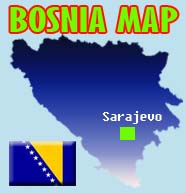Bosnia remains blocked amid hatred and mistrust
 Sarajevo- Despite a 13-year, multi-billion-dollar international peacekeeping and development effort in Bosnia, Western officials now openly admit it: the divided country is stuck in a blind alley and nobody sees the way out.
Sarajevo- Despite a 13-year, multi-billion-dollar international peacekeeping and development effort in Bosnia, Western officials now openly admit it: the divided country is stuck in a blind alley and nobody sees the way out.
The disappointment, the most severe since the end of the 1992-95 war, now runs in the open. The European Union's Enlargement Commissioner expressed it last week in the capital Sarajevo. The international administrator Miroslav Lajcak did the same this week in the Bosnian Serb capital Banja Luka.
US, British, German and Dutch ambassadors also spoke of the Bosnian paralysis, caused by persisting hatred among Muslims and Serbs. Each continue to run their own respective "entity" and perceive the other as an enemy.
The Muslims and Croats, who make up roughly 50 and 15 per cent of the 4 million Bosnians, largely remain in the Federation of Bosnia and Herzegovina. Meanwhile the Serbs, or one-third of the population, reside in the Serb Republic (RS).
The war-ending Dayton peace agreement established the largely autonomous entities to keep the hostile ethnic groups away from each others' throats, along with a weak central administration that was supposed to grow with time.
But given the unbearable animosity between Muslims and Serbs, joint institutions have ground to a halt. Not even Lajcak, the international representative with broad authority to govern in Bosnia, knows how to unblock them.
Neither government nor courts function on a national level. That discourages foreign investors, who see a complex, expensive administrative monstrosity comprising two nearly independent entities, 10 cantons and the special district of Brcko.
Meanwhile, instead of slowly becoming integrated into Bosnia- Herzegovina, as envisaged by peacemakers in 1995, the RS became stronger. It flexed its muscle this week when it rejected a constitutional reform which would have diminished its jurisdiction in favour of the central government.
With that, the Serbs have precluded Bosnia from moving closer to EU membership, because Brussels has set the constitutional reform as a precondition for closer ties.
Serbs also rejected an earlier, slight concession within the framework of reforms that aimed at establishing a functional police force for the entire Bosnia, another demand by the EU.
The RS assembly also resolved that the Serb entity may split from Bosnia and join the "mother republic' Serbia - which was the aim of the nationalists on the eve of the Bosnian war, the bloodiest of all conflicts following the violent disintegration of the former Yugoslavia.
On a political level, RS Prime Minister Milorad Dodik is virtually unchallenged, making him the undisputed representative of Serb policies.
His antipode in Sarajevo - Muslim leader Haris Silajdzic - accuses the Serbs of building their republic atop the genocide of Muslims. Silajdzic has called for the RS to be dismantled.
Both continue pushing and pulling their way, though international leaders continue uttering the mantra: neither the secession, nor the dissolution of the Serb republic are an option.
The Slovak diplomat Lajcak says he is "a bit tired" of it all by now. Meanwhile, the EU is preparing to pull out its last 2,125 soldiers remaining form the tens of thousands deployed under NATO command at the end of the Bosnian war 13 years ago.
The disappointment is understandable, as Bosnia has missed the chance to take a step toward recovery from a conflict which killed 100,000 and crippled many more.
Though billions of dollars were siphoned into it, the country is at a standstill that reaches beyond politics. The infrastructure is undeveloped, the economy moribund and substantial prosperity is nowhere in sight.
Only corruption prospers under these conditions. In 2005, a parliamentary committee has discovered that out of 5.5 billion euros of aid (7.47 billion dollars), some 2 billion had "evaporated." (dpa)